Queered Science is a series of profiles meant to highlight queer scientists and tell you all about them, for your intellectual edification and so you don’t feel excluded from a predominantly heterosexist subset of academia and industry.
Currently one of the most high-profile queer scientists right now is Dr. Ben Barres, who is a professor of neurobiology, developmental biology, and neurology at the Stanford University School of Medicine. He’s important to us because he’s been vocal in the fight against misogyny in the sciences. He’s also openly transgender, and has extensively discussed his identity and his experiences with the press and the general public.
Dr. Barres was always interested in science since childhood; he remembers playing with chemistry sets, magnifying glasses — all the nerdy things he could get his hands on. He also struggled with gender since he was young: “I was kind of ostracized growing up. I was never in the “in” group. I was always sort of socially rejected. Because I was different. I really was sort of like that boy in a dress, or something.”
He originally went to MIT interested in electrical engineering, but decided to focus on neurology after a particularly inspiring class on the brain in his sophomore year. “I was very intense about my studies. I knew a lot about science, but I didn’t know a lot about other stuff. I was a typical science geek, and I really had no other interests… I was very driven. I worked seven days a week, fifteen-hour days…”

Barres has also described that he felt more comfortable in professional settings than personal ones, because at work he didn’t have to wrestle with the questions of gender identity that haunted him in his personal life. In many ways this echoes what we already know, and what Dr. Erin Cech’s work highlights: that queer students often feel a strong separation between personal and public life, and are constantly juggling a kind of “mental calculus” over where exactly that boundary lies.
“I really felt by that point that life had been so hard on me- I never feel like I really do a good job explaining what it was like, but I didn’t sleep lots of nights, I was suicidal, life was so uncomfortable. Don’t get me wrong, I’ve really enjoyed my life, but somehow it’s like it was split into two parts. The person part, which has been very uncomfortable, and the professional part that’s been a pleasure, and I’ve really enjoyed. But the personal part was just so uncomfortable that sometimes you think, ‘I’ve had enough.’ It’s that distressing.”
At 40, already well established in the science community as a woman, Barres decided to transition. “I did not understand why I was different and I was too ashamed to ever once discuss my feelings with anyone. At the age of 40 years old, I learned about transsexualism, and decided to change my sex. Even though I worried that it would seriously harm my scientific career, I found that the opportunity to become a man was irresistible.”
He says he was in denial about the presence of gender discrimination in the sciences until his transition, at which point he saw first-hand the differences in how people treated him. He tells a now-famous anecdote: after giving a talk shortly after his transition to living as a man, he overheard a colleague say, “Ben Barres gave a great seminar today, but his work is much better than his sister’s work.” This inferior “sister” was none other than Barres pre-transition, and the work being presented was the exact same work. This was an inarguable example of gendered stereotypes of scientific competency at work.
Since then, he has dedicated a significant portion of his work to eradicating misogyny in the sciences. “As is true for many successful scientists, I had never thought much about gender discrimination. It did not occur to me that it was a serious problem. After all if I could attain tenure and full professorship as a woman, why couldn’t every other woman? It didn’t occur to me to think that I just might have been lucky or that I might have been successful by being several times more productive than comparable men in my career cohort.”
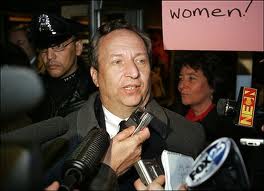
via wonkette.com
In 2005, the president of Harvard, Larry Summers, gave a talk at Harvard in which he suggested that women are innately worse at science than men. Summers based much of his argument on The Blank Slate: The Modern Denial of Human Nature by Steven Pinker, in which Pinker states, among other things, that men are inherently “risk-taking achievers who can willingly endure discomfort in pursuit of success” and that “women are more likely to choose administrative support jobs that offer low pay in air-conditioned offices.”
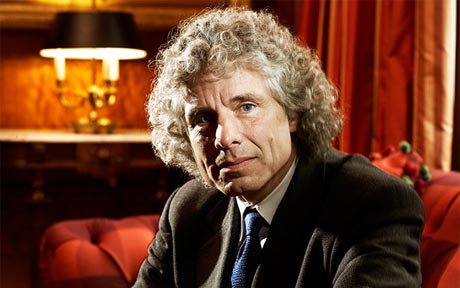
via telegraph.co.uk
The puzzling non sequitur of air-conditioned offices aside, (what does that have to do with anything?), obviously we disagree, and so did Dr. Barres. He wrote a pointed counterargument called “Does Gender Matter?” published in 2006 in Nature. And just like that, Barres was famous. “This is a street fight,” he says. He pointed out that much of Pinker’s work (and many similar theories as well) is based on evolutionary psychology, a field that has for the most part been strongly trounced. Barres argues that there is no evidence, only speculations on top of speculations, that women are innately bad at science thinking. However, there is strong evidence that prejudice, latent or obvious, against minority groups significantly decreases their success.
Just as Dr. Erin Cech mentioned last time, stereotype threat plays a huge part in minorities’ success: Barres defines stereotype threat as “the fear that one’s behavior will confirm an existing stereotype of a group with which one identifies… This fear causes an impairment of performance.” So, in practical terms, it’s been proven that women perform far worse on a science test if they are reminded beforehand that women are bad at science.
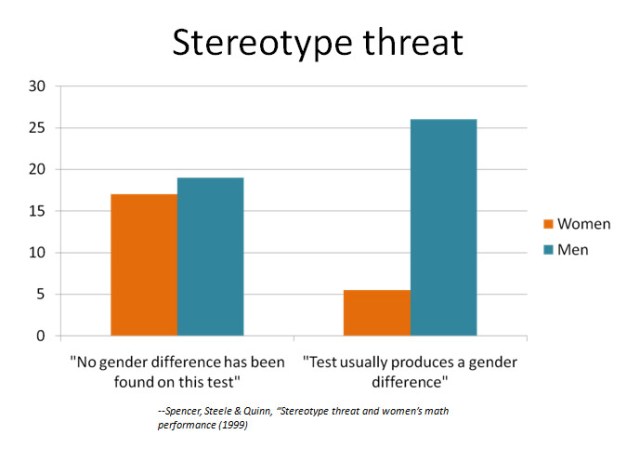
What’s more, the scientific community should have a huge incentive to minimize exclusion of minorities in the sciences, for its own good; white men account for eight percent of the population, but constitute far higher percentages in the sciences. And the probability of getting the best and brightest minds from that eight percent is incredibly low. The longer we go with such a limited slice of our population, the longer we are only shooting ourselves in the collective foot.
After his commentary was published in Nature, other colleagues at Harvard used slurs about his transgender status to denigrate his work. Barres reports that Harry Mansfield called him a “political fruitcake,” and Steven Pinker said that Barres had “reduced science to Oprah.” Both of these men are also professors at Harvard. Regardless of the fact that these insults are glaringly unprofessional and inappropriate to any work setting, their spluttering inability to come up with coherent objections to his work shows that they have no real support for what they’re saying. Keep in mind that Mansfield, a philosophy professor, has also stated in the past (in his 2006 book Manliness): “Is it possible to teach a women manliness and thus to become more assertive? Or is that like teaching a cat to bark?”
Obviously these guys need to revise their gender beliefs a little, and it’s disturbing that they are professors of psychology and philosophy at Harvard. They occupy positions of moral and intellectual authority, and it seems frankly irresponsible that the leaders of schools like Harvard continue to allow this kind of ignorant rhetoric from teachers and mentors. Oh, but I forgot – the president of Harvard is the one whose sexist comments started this controversy in the first place. That was dumb – but I am a woman, after all.
In general, their way of thinking is on the way out – thankfully. The vast majority of emails that Barres receives on this topic are overwhelmingly positive. Look at this one, for instance:
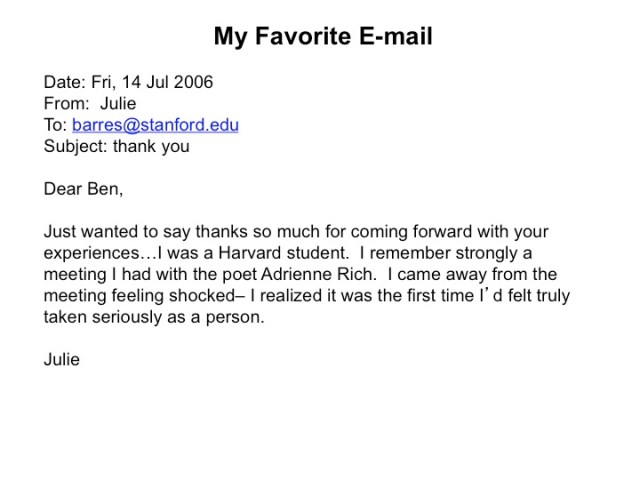
Things like stereotype threat and internalized prejudice don’t just apply to women, they also apply to any other minority status – like queer or trans* identities.
Barres spends a lot of time speaking openly and publicly about his transgender identity, in the hopes of supporting other LGBTQ scientists.
“I have become aware that there are many students and academics who are gay who are still closeted, even in the Bay Area, for fear of harmful repercussions to their lives and careers. I always advise them to be open about who they are, including on job interviews, and I have yet to see one not get their first choice job. Your difference is your greatest advantage. Don’t let others take your happiness away.”
He is an inspiring example of using positions of power to effect social change. While he says his colleagues at Stanford (in an open-minded and liberal part of the world, it should be noted) have been overwhelmingly supportive — not everyone is. “I am tired of powerful people using their position to demean me just because I am different from them…I will certainly not sit around silently and endure them.”
Download slides from his basic talk.




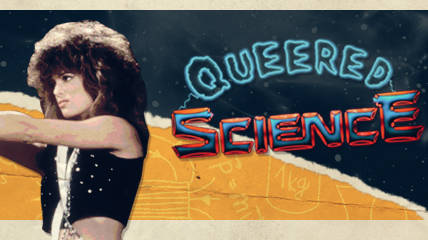




Comments
Great read! Thanks
8 percent of what population?
People who use “science” to explain their sexism are quite frustrating. Interesting article
My guess is the world population. 8% of people on Earth being white males.
I figured. Not trying to dispute any numbers, I am just curious to know what the breakdown of people in the sciences is worldwide. (I guess that is hard to define though).
yes, that’s 8 percent of the world population, I’m sorry if that wasn’t clear. I don’t have any good figures on demographics within the sciences either, but one of the upcoming articles profiles a study you might be interested in. It’s by Jeremy Yoder and Allison Matthias and called “Queer in Stem: A national survey of sexual diversity in science, technology, engineering, and mathematics.” You can see their preliminary results here:
http://www.queerstem.org/2013/09/preliminary-results-who-answered-survey.html
A great post, Ben Barres is just one of several trans neuroscientists who are doing great work (I also recommend reading about Vivienne L’Ecuyer Ming, a trans neuroscientist in the Bay Area who was profiled in the NY Times).
However, including Adrienne Rich as an example of new thinking is a flawed example. Ms. Rich, as acclaimed a poet and feminist as she was, also was connected to a lot of second wave feminist transmisogyny of the worst kind. Juxtaposing her next to a trans person as somehow being ‘allies’ in struggle is seriously flawed.
You’re right, it’s important to acknowledge and condemn the transmisogyny that Rich was connected with in her career; for instance, she was involved with the publication of The Transsexual Empire, a problematic and transmisogynistic book that provided a base for trans hatred in feminism. The feminist movement has historically had trouble recognizing and condemning her transphobic words and actions, and that needs to be fixed.
The email including her name is a slide from a talk Dr. Barres gave at Harvard. In his talk, he explains that this was just one example of the kinds of responses he got from women at Harvard after he went public with his story: almost all were very supportive, because he was articulating the kind of sexism they experienced on a daily basis. I included the image in the same spirit. While I can’t speak to Dr. Barres’ intentions, I certainly was not holding Rich up next to Barres as being ‘allies’ in this struggle. For the purposes of this article, her name only appeared incidentally in the context of ‘Julie’s’ story and support for Barres.
If you needed further proof that Steven Pinker is full of it, I took a psychology class with him my freshman year while he was still at MIT. Even in my pre-feminist, naive youth, I could tell he was a jackwad – I didn’t know the word “mansplainer” yet. The reading list was basically everything he’s ever written.
He gave a lecture once on what “all human beings inherently find attractive” (eh?) because evolution or something. He named (and explained why) curly hair, blue eyes, a strong jawline… and it soon became obvious he was describing himself. Then he joked about how lucky he was. And winked.
I’m surprised my eyeballs are still attached, they rolled so far back into my head.
Okay, I just threw up in my mouth a little bit remembering that story. Good thing I have whiskey.
Recently started reading one of his books (had no idea who he was) and barely got through the introduction because something about tone grated so much —> “mansplaining”
I have worked outside with enough talented female field technicians to know Pinker apparently hasn’t ventured out of his men’s only urinal which he calls ‘science’; But I’ve also seen first hand the prejudices female academics face with their own male colleagues, for which Barres bears first hand experience. We work hard, to the point that we also sublimate our own femaleness and individuality to merely gain the same respect our male counterparts have seemingly by right. We forget too how mutable sex and gender can be, even for other organisms. Female birds can take on the plumage of males by virtue of hormone changes, by the same token, birds which maintain pair bonds look identical to one another; High ranking female hyenas develop an everted phallus like uterus, and marine flatworms are hermaphrodites with mere genital spaces for thrusting into other genital spaces… Lets not speak of the torrid sex lives of plants…
Joan Roughgarden is another incredible scientist who was able to experience reverse discrimination after she transitioned, well in the midst of her professional career. She was a professor at Stanford both pre and post transition, and retired to move to Hawaii in 2011. i have had the pleasure of seeing her speak a few times. After one of her talks i was able to meet with her for an interview i was doing for our college radio station. She was really wonderful to talk to and so supportive of my non-gendered approach to blurring the lines, it was just what i needed at a time of struggling with how to present myself in the lab and still be taken seriously.
Her book titled ‘Evolution’s Rainbow’ is a great and interesting read, even for those of the non-science geek variety. (but for a geek and genderqueer, its super awesome!) Also, her book titled ‘The Genial Gene: Deconstructing Darwinian Selfishness’ is a good one as well. Basically, here is a MTF evolutionary biologist who, through research across numerous species, seriously calls into question the heterocentric perspective of ‘natrual selection’ and other sexual selection theories in nature. Pretty fantastic.
Oh my gosh, yes, ‘Evolution’s’ Rainbow has been on my reading list since I started the series, I can’t wait to read it!
Terrific idea for a column and great interviewee for first article. I was very interested in the gender bias project mentioned in the interview, and excited that they described how to identify common forms of gender bias: for example, when asserting themselves, men are viewed as assertive (successful) and women, aggressive (personality defect). However, I was absolutely horrified at the actual advice offered in video clips of female gender bias experts on this site, such as “smile more” or otherwise send out feminine signals. http://www.genderbiasbingo.com/strategies_doublebind.html I am commenting here in the hopes that the readers of Autostraddle and maybe even the interviewer/ interviewee can offer us more than ‘conform to gender stereotypes’ as a strategy. It was so disappointing to hope for professional insight and be handed the psychological equivalent of an apron and frying pan.
The Gender Bias Project was hotlinked at the bottom of the article, where it says ‘Download slides from his basic talk’.
I see your point. I’ve run into the exact same discussion before, not on the Gender Bias Project, but in articles on sexism in the workplace in other publications. The phrase “men are assertive, women are agressive” rings painfully familiar, as do the suggestions: smile more, be more friendly, etc. In response to your comment I’ve given some thought to what other strategies we could employ, because I wholeheartedly agree that just conforming more stringently to gender stereotypes gets us nowhere. Not only might it feel disingenuous and wrong to us personally, but by adhering to sexist stereotypes we don’t effect any real change. Our day-to-day life in the office might *feel* easier on a surface level, but we are leaving all the same walls up for everyone else who comes behind us.
However, in thinking about what other things we could do that would be more productive, I keep running into the same problem: this is not *our* problem to fix. Yes, the consequences come out at us, but gender bias is a problem in the worldview of those who are discriminating against us. If a boss inherently sees women as less competent, nothing we do personally will fix that. And further, we should not feel saddled with yet another burden. It is not our responsibility to fix.
The most important thing I’ve come up with so far is that our job is to remember gender bias exists, in all its varied forms, and to not assume our own incompetence if we don’t get a raise/promotion/grant etc. And, if at all possible, to talk openly about all kinds of bias, not just gender bias, in our workplaces. I know that’s not much but it’s what I have come up with for a start. Have you noticed the Open Threads that accompany this series? The last was on coming out in the sciences (http://develop.autostraddle.com/open-thread-coming-out-in-the-sciences-lets-discuss/) and I’ll open up this very question for discussion among readers in the next Open Thread. Thanks for the great question.
Wow thanks for the detailed response and open thread link, Vivian! In terms of practical strategies for gender bias, I had a few thoughts:
1) Dr. Barres suggested in his Nature article ‘Does Gender Matter?’ and also mentioned in the interview above (and you also mentioned): raising awareness, asking for data/citations when people make sexist statements. I think being aware of common forms of gender bias is possibly the greatest tool we have right now.
2) For gender bias on hiring: request that gender identifiers be redacted from paper applications, so we can at least try to get to the interview round on equal footing.
3) For equal pay, talk to the business office to really understand what criteria are used to set pay lines, and how much info is available on average pay for males v females for the same position in the company or similar companies in the area.
4) For interpersonal interactions: be more aware of non-verbal communication. This for me was a big breakthrough in terms of being competent and confident, and being perceived that way by others. Get myself in the habit of communicating with energy level first, and then words. Picture myself as a natural leader, calm and assertive, and having good interactions with others. I try to observe behaviors and speech patterns in others that are good leaders, and try to emulate them (male or female — sadly, usually male). This may seem unrelated to gender bias, or even sound sexist, but I find that women tend to be verbal, whereas men communicate more with energy level. Rather than conforming to gender stereotypes with respect to communication styles, if we are simply aware of the spectrum of verbal to non-verbal communication and find where we are most confident and effective on that spectrum, it goes a long way towards presenting ourselves well even when asking for a raise or expressing a strong opinion, without needing to “send out femme-y signals”. What do you think?
About your comment re: it’s not our job to overcome gender bias: I agree people shouldn’t feel obligated, but then again if someone (like me) *wants* to instigate change and raise awareness, they have that choice and should have readily available tools from experts to help us do that. I thought about moderating a gender bias panel at my grad school open house, even though I’m minimally qualified. I think higher ed institutions should require employees to have gender bias awareness training and methods to report and correct discrimination.
come look at the open thread we just made about it, and add your comments! http://develop.autostraddle.com/queered-science-gender-bias-open-thread-199195/ Thanks for the great idea :)
Great article! It gives me a warm happy feeling when openly trans folks are in the sciences and talking about the rampant discrimination therein.
I mean, the way in which we ask scientific questions and create hypotheses is a function of the personal biases and assumptions of the scientist conducting the research. Acknowledging these biases would be extremely helpful in my own field, where “evidence based treatment” has become both law and religion, despite the lack of consideration into what evidence based even means.
Ugh, evolutionary psychology. Can it just go away? I think I have long term anger issues from being forced to ponder this topic alone.
“Your difference is your greatest advantage. Don’t let others take your happiness away.”
I’m putting that on my wall
Very interesting article. It’s the first article I have read in your series, and now I wish to read some of the other article in your series. Women in science, and especially lesbian / bisexual / queer / transgender women, is a topic very close to my heart. I am a scientist (although I don’t work in the field, I work in research administration at a university) and an out lesbian. Enhancing an interest in science amongst women (and specifically lesbian / bi / trans women), the gender imbalance in science and issues (whether positive or negative) faced by LGBTQI individuals in science and academia are areas of interest for me. Thanks for the article and for disemminating this important topic to fellow lesbian / bisexual / transgendered women.
Thank you! Are you by any chance the author of the Sapphic Scientist blog? http://sapphicscientist.blogspot.com/
Hi Vivian. Thanks for you comment. Yes, I am the author of the Sapphic Scientist Blog on Blogspot, however I concentrate on my blogs via WordPress – http://www.sapphicscientist.wordpress.com and http://www.lipstickonmylabcoat.wordpress.com. Fascinating article. Keep up the good work of discussing lesbian scientists and discussing science for a lesbian / bisexual audience.